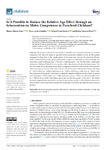Mostrar o rexistro simple do ítem
Is It Possible to Reduce the Relative Age Effect through an Intervention on Motor Competence in Preschool Children?
| dc.contributor.author | Mecías Calvo, Marcos | |
| dc.contributor.author | Arufe-Giráldez, Víctor | |
| dc.contributor.author | Cons-Ferreiro, Miguel | |
| dc.contributor.author | Navarro Patón, Rubén | |
| dc.date.accessioned | 2022-01-21T13:14:17Z | |
| dc.date.available | 2022-01-21T13:14:17Z | |
| dc.date.issued | 2021 | |
| dc.identifier.citation | Mecías-Calvo, M.; Arufe-Giráldez, V.; Cons-Ferreiro, M.; Navarro-Patón, R. Is It Possible to Reduce the Relative Age Effect through an Intervention on Motor Competence in Preschool Children? Children 2021, 8, 386. https://doi.org/10.3390/children8050386 | es_ES |
| dc.identifier.uri | http://hdl.handle.net/2183/29458 | |
| dc.description | Os datos do estudo non están dispoñibles, segundo a Regulación do Parlamento e Consello Europeos (UE) 2016/679 de 27 Abril 2016 sobre a protección de datos persoais (RGPD). | es_ES |
| dc.description | This article belongs to the Special Issue Physical Activity and Exercise Science for Children | |
| dc.description.abstract | [Abstract] The purpose of the study was to find out whether a short 6-week intervention on motor competence can reduce the Relative Age Effect (RAE) of preschool children born in the first quarter, compared to those born in the fourth quarter of the same year. Seventy-six preschool children (5.20 ± 0.54 years) from Lugo (Spain) participated. A quasi-experimental pre-post-test design was used with an intervention group (n = 32) and a control group (n = 44). The Movement Assessment Battery for Children-2 (MABC-2) was used to collect data before and after the intervention. The data show that, before the intervention, there are significant differences between the control and the intervention group in favor of the former (born in the first quarter of the year) in manual dexterity (p = 0.011), balance (p = 0.002), total test score (p = 0.008), and total percentile score (p = 0.010). After the application of the specific intervention, statistically significant differences were found in aiming and catching (p < 0.001), balance (p = 0.022), total test score (p = 0.001), and total percentile score (p < 0.001) in favor of the intervention group (born in the last quarter of the year). The results obtained suggest that the application of a specific intervention on MC could positively influence the improvement of MC in preschool children (boys and girls) and reduce the differences produced by the RAE. | es_ES |
| dc.language.iso | eng | es_ES |
| dc.relation.uri | https://doi.org/10.3390/children8050386 | es_ES |
| dc.rights | Atribución 4.0 Internacional | es_ES |
| dc.rights.uri | http://creativecommons.org/licenses/by/3.0/es/ | * |
| dc.subject | Physical education | es_ES |
| dc.subject | Specific intervention | es_ES |
| dc.subject | Childhood | es_ES |
| dc.subject | Manual dexterity | es_ES |
| dc.subject | Aiming and catching | es_ES |
| dc.subject | Balance | es_ES |
| dc.subject | MABC-2 | es_ES |
| dc.title | Is It Possible to Reduce the Relative Age Effect through an Intervention on Motor Competence in Preschool Children? | es_ES |
| dc.type | info:eu-repo/semantics/article | es_ES |
| dc.rights.access | info:eu-repo/semantics/openAccess | es_ES |
| UDC.journalTitle | Children | es_ES |
| UDC.volume | 8 | es_ES |
| UDC.issue | 5 | es_ES |
| UDC.startPage | 386 | es_ES |
| dc.identifier.doi | 10.3390/children8050386 |
Ficheiros no ítem
Este ítem aparece na(s) seguinte(s) colección(s)
-
UI- UNIDEF - Artigos [35]






